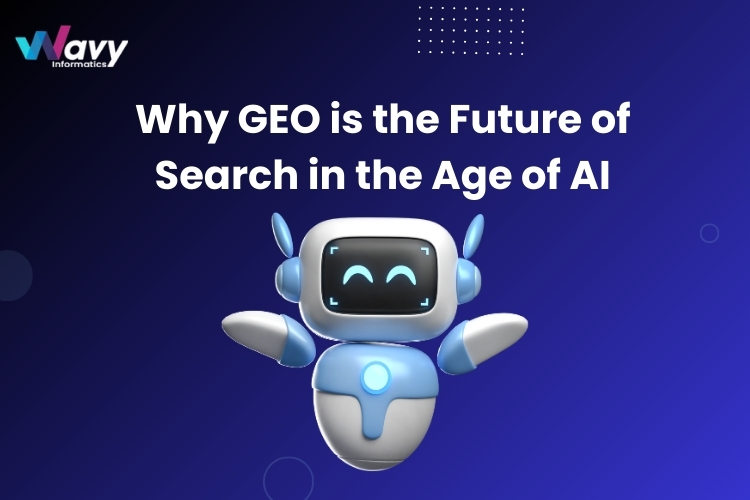
Search is changing faster than ever before. Not too long ago, businesses focused only on ranking high on Google with SEO (Search Engine Optimization). But with the rise of AI-powered search engines and chatbots like ChatGPT, Gemini, and Bing Copilot, the way people find answers online has completely transformed. This shift has given birth to a new approach called Generative Engine Optimization (GEO) — and it’s set to become the future of search. If SEO were about ranking on Google, GEO is about being visible in AI-generated answers.
In this blog, we’ll explore what GEO is, why it matters, how it connects to Digital Marketing, and how companies like Wavy Informatics are preparing for this future.
Generative Engine Optimization (GEO) is the process of making sure your content gets picked up and presented by AI-powered search engines and chatbots.
Instead of just showing a list of websites, these engines generate answers in natural language. For example:
With GEO, the goal is simple: make your brand appear in those generated answers.
AI assistants are now part of daily life. People ask Alexa, Siri, or ChatGPT for advice instead of opening a browser.
Instead of scrolling through pages of results, people prefer quick, conversational answers. GEO ensures your content is included in these AI responses.
AI engines don’t just pull random data. They rely on trusted, authoritative, and high-quality content. That means businesses must focus on valuable digital marketing content instead of just keyword tricks.
For years, businesses fought for the first page on Google. Now, the real battle is to be part of AI’s generated answer. GEO is the way forward.
| SEO | GEO |
| Focused on Google ranking and keywords | Focused on AI answers and context |
| Optimizes for algorithms | Optimizes for AI-generated summaries |
| Users click links | Users get direct answers |
| Keyword-based | Conversational and intent-based |
Both are important, but GEO is where the future is heading. Think of GEO as SEO’s smarter, AI-driven cousin.
Digital marketing is already about creating value through blogs, videos, social media, and ads. GEO takes this a step further:
At Wavy Informatics, we believe businesses that blend digital marketing with GEO strategies will dominate future search. It’s not just about creating content; it’s about creating content AI trusts.
Here’s how businesses can start building for the GEO era:
Create blogs, FAQs, and guides that answer real user questions in simple language.
Write like you’re explaining to a friend. AI tools prefer natural, human-style writing.
Use case studies, expert quotes, and trusted data to make your content credible.
Share your content across social media, videos, and email campaigns. The more visibility, the more trust you build.
Test how your brand shows up on ChatGPT, Gemini, or Bing. See what’s missing and optimize for it.
At Wavy Informatics, we’ve always believed in staying ahead of digital trends. Just as we embraced SEO and digital marketing years ago, we now see GEO as the next big shift.
Businesses that adapt early will enjoy:
We’re already helping clients shape strategies for GEO — from content optimization to AI-focused digital marketing campaigns.
SEO is about ranking on Google search results, while GEO is about being visible in AI-generated answers from tools like ChatGPT, Bing Copilot, and Gemini.
Not really. SEO is still important, but GEO is the next step. Think of them as working together — SEO builds visibility, while GEO ensures AI uses your content.
With GEO, your business can appear directly in AI answers. That means users see your brand instantly without needing to scroll or click multiple links.
Digital marketing creates the content foundation for GEO. Blogs, videos, and social posts help AI engines see your brand as credible and trustworthy.
Yes. In fact, GEO can be a big advantage for small businesses. By answering niche questions and creating valuable content, smaller brands can appear in AI results just as much as larger ones.
The way people search online is changing forever. AI is making search more conversational, fast, and personalized. Businesses that stick only to traditional SEO may fall behind.
Generative Engine Optimization (GEO) is the future — it ensures your brand shows up where users are looking: in AI-driven answers.
At Wavy Informatics, we believe combining digital marketing with GEO is the smartest way forward. It’s about building content that’s useful, human, and trusted by AI.
If SEO got you on Google’s first page, GEO will put you in the AI spotlight. And that’s where the future of search truly lives.
Also Read – The Future of Search Optimization